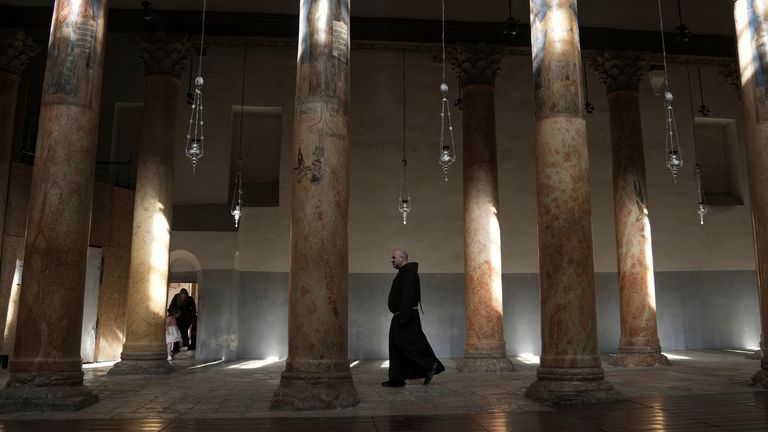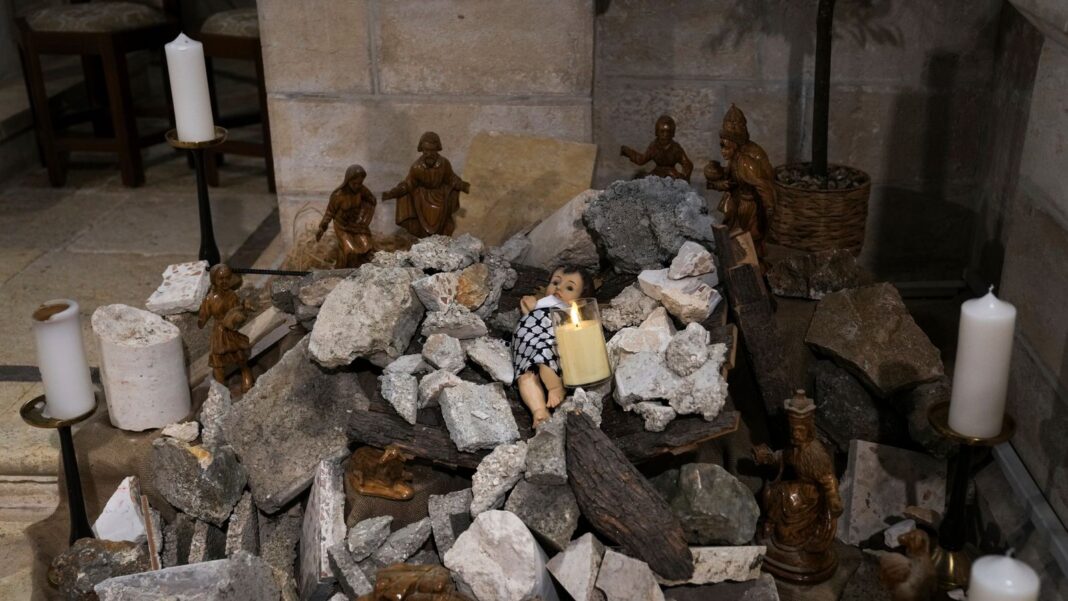The main road into Bethlehem is closed. What is normally a simple 20-minute journey from Jerusalem now takes us an hour, as cars queue to get through the one Israeli military checkpoint open further south.
It’s been like this since the war began, and it’s just one way that life in the West Bank has become much harder for Palestinians.
In Manger Square, the shops selling Christmas decorations and souvenirs are mostly closed, shutters pulled down.
Follow latest: UN stops short of calling for a ceasefire
We find one shop open, it has been owned by three generations of the Tabash family since 1927, but they haven’t done any business for months and say that even during the coronavirus pandemic, it was never as bad as it is now.
“We never have this situation. Even in COVID time, we used to have a little bit of some people coming,” Rony Tabash tells me.
“Usually we are full of pilgrims, full of tourists. Now we can see Bethlehem. It’s like the desert, we are almost two months without any business.
“We open every day because this place is part of our heart, part of our history, so we come here. Me and my father, my brother, to greet the people, to stay, to drink coffee.
“Because really, this place is part of our heart. We always hope for a better future for all the world, especially not for us, for our children, for our future, for our real future.”
Click to subscribe to the Sky News Daily wherever you get your podcasts
The Church of the Nativity, normally heaving with tourists and pilgrims, is quiet, even during a Sunday mass in December.
A few Palestinian Christians attend the weekly service and pray in the grotto where Jesus is said to have been born, but the excitement and joy of Christmas time are absent this year.
This content is provided by Spreaker, which may be using cookies and other technologies.
To show you this content, we need your permission to use cookies.
You can use the buttons below to amend your preferences to enable Spreaker cookies or to allow those cookies just once.
You can change your settings at any time via the Privacy Options.
Unfortunately we have been unable to verify if you have consented to Spreaker cookies.
To view this content you can use the button below to allow Spreaker cookies for this session only.
For the first time in living memory, there won’t be a Christmas tree in Manger Square this year.
“This year we will pray at Christmas and we will celebrate the progress. But there will be no festivals, nothing. So we hope that after Christmas it will be good. I hope so,” says Rony.
A few hundred metres away, through the market and up the hill is the Church of Lutheran Christmas.
Inside they have made a crib of rubble and laid in it a baby wrapped in the black and white Palestinian kufiyah – an image that has gone around the world as a sign of the suffering in Gaza this Christmas.
An installation of a scene of the Nativity of Christ with a figure symbolising baby Jesus lying amid the rubble inside the Evangelical Lutheran Church in Bethlehem. Pic: AP
“Every year at this place, we have a Christmas tree with lights and gifts,” Reverend Munther Isaac explains.
“However, this year there are no celebrations in Palestine and Bethlehem, for it is impossible to celebrate with a genocide taking place in our land against our people.
“No one is in a mood to celebrate, yet at the same time in our church we wanted to bring the meaning of Christmas to life and to explain what Christmas means to our people.
Read more:
MP fears family in Gaza ‘won’t survive’ Christmas
Children mourn father after Rafah strike

A priest walks at the Church of the Nativity. Pic: AP
“We want to send a message to the world that in the homeland of Christmas, that this is what Christmas looks like. The world is celebrating Christmas right now in different ways, with joyful celebrations, lighting of Christmas trees and celebrations and events, but in the home of Christmas, this is what Christmas looks like.
“Children being pulled from under the rubble.”
The holy land is a place of hope and miracles for many, and they will be praying for a ceasefire here this Christmas.
But amid the echoes of Gaza, the sounds of war and the images of death, peace feels a long way away.







